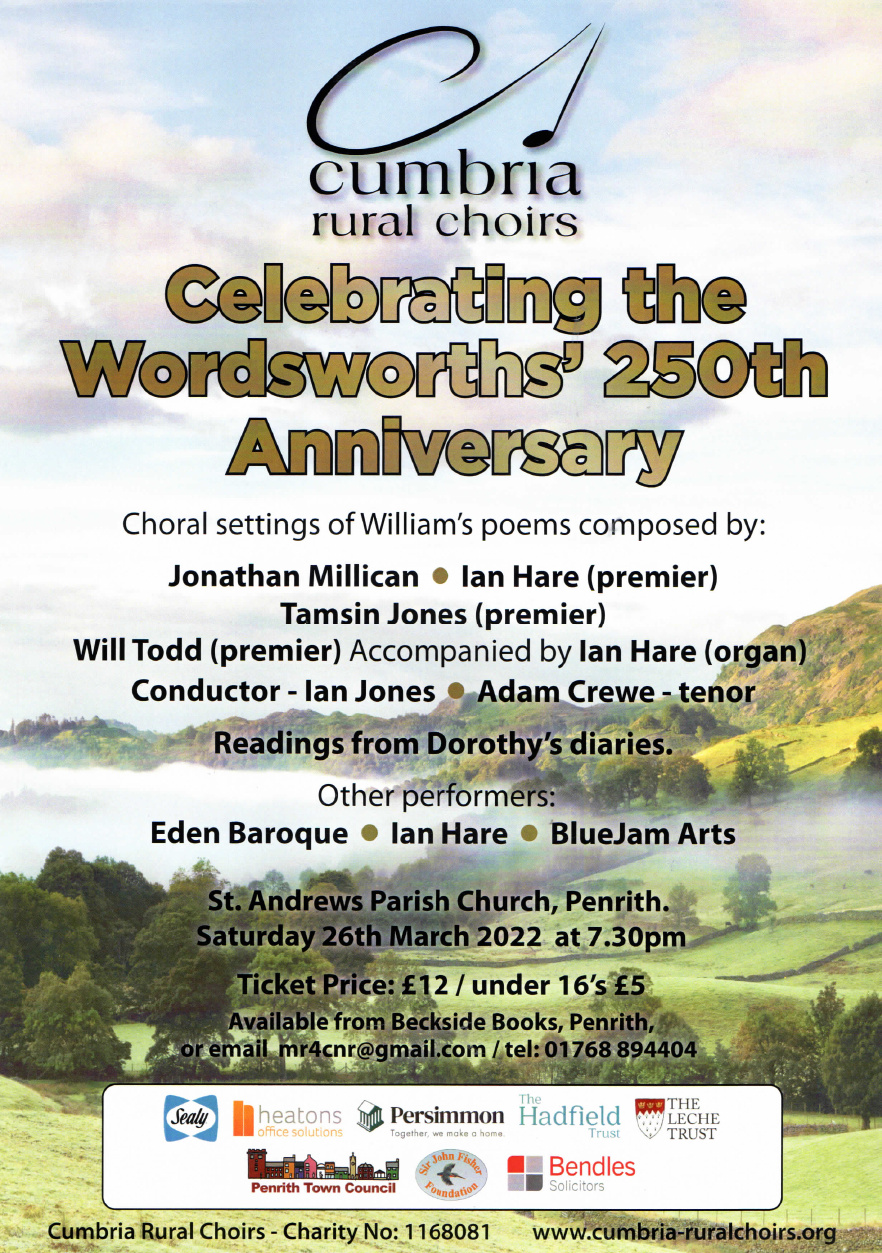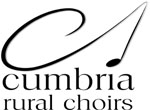Final Concert as Cumbria Rural Choirs, March 2022
“Celebrating the Wordsworths”

Saturday, 26th March 2022 at 7.30 pm
St. Andrew’s Church, Penrith was selected as the venue for this concert because of Wordsworth’s historical associations with the town in which he spent his early school years. We celebrated the lives of both William and his sister Dorothy, also a poet and author. Originally planned for 2020, marking the 250th anniversary of the birth of William, the event also marked the 250th anniversary of the birth of Dorothy on December 25th 1771. During their time in Penrith, William and Dorothy attended Dame Birkett’s infant school in St. Andrews’s Place.
The concert provided an opportunity for us to premier the three commissioned works from the cancelled concert in 2020:
- Daffodils (Tamsin Jones)
- Springtime in Lakeland (Ian Hare)
- We are Laid Asleep (Will Todd)
Also included was Influence of Natural Objects (Jonathan Millican). This piece was commissioned by Cumbria Festival Chorus for their Celebrating Wordsworth Concert, originally planned for July 2020.
In addition, the concert featured a solo organ piece, There was a time (Gerald Finzi) (prelude for organ, arranged from Intimations of Immortality Ode (Andrew Seivewright) performed by Ian Hare , together with performances of music contemporary to Wordsworth by Eden Baroque with Katharine May on harpsichord and Michael Sanderson on baroque violin, and extracts from Dorothy Wordsworth’s diaries read by Alex Jakob-Whitworth.
The Chorus Director and Conductor for this concert was Ian Jones, of Cumbria Festival Chorus, with accompaniment provided by Ian Hare on the organ.
Review
Like many choral groups Cumbria Rural Choirs has had a difficult two years. 2020’s planned concert – Celebrating the Wordsworths’ 250th Anniversary – was cancelled because of the COVID pandemic, but made a most welcome reappearance two years later in the Georgian church of St. Andrew’s, Penrith, a church well known to William and his sister Dorothy, who were for a time pupils at Dame Birkett’s infant school in St. Andrew’s Place.
The programme not only reflected William’s poems and Dorothy’s diaries, but had a strong Cumbrian link in the choice of the composers and performers taking part. Three of the four choral works in the concert were specially commissioned by Cumbria Rural Choirs for this Wordsworth Celebration. Alex Jakob-Whitworth, dressed in period costume, read several extracts from Dorothy’s diaries and gave an informative introduction to the programme.
The choir was more than halved in numbers from the projected 80 voices expecting to sing in the 2020 concert. Under the experienced direction of Ian jones, they tackled a challenging programme of unfamiliar works with great courage, but inevitably lacked the power to convey some of the intense and closely-drawn textures of Jonathan Millican’s Influence of Natural Objects, in which Adam Crewe (tenor) sang the role of Wordsworth himself effectively. Will Todd’s We are laid asleep, three settings of poems from “Tintern Abbey”, offered more secure ground, despite occasional difficulties with tuning. The atmospheric start of the opening poem, underlaid with gently-flowing textures was brought over well, as were the shimmering harmonies of Still Music. The final poem, Nature’s Carol, with its gospel rhythms and drum accompaniment, made a good ending to the first half of the programme.
Tamsin Jones’ setting of Daffodils conveyed well the dance-like elements of Wordsworth’s renowned poem, the final gigue being the most effective. Ian Hare has had a number of works performed by the Rural Choirs in the past and Springtime in Lakeland was a welcome addition. Highlights were the flowing undulations and rippling atmosphere of The Lake at Evening, the sparkling texture of The Rainbow and the reassuring chordal writing Home at Grasmere. The choir themselves felt at home in this work and there was some impressive singing from the men’s voices in particular. Ian was an accomplished accompanist throughout the evening and also played Andrew Seivewright’s organ arrangement of Gerald Finzi’s setting of Wordsworth’s Ode on “Intimations of immortality from recollections of early childhood” – a sensitive performance, which brought out the full range of the instrument’s tone colours.
Eden Baroque took us back to English music of earlier times with lute songs by Dowland and Latner, two songs by Purcell and a Handel aria, as well as an attractive modern setting of John Donne’s The Good-Morrow by Tamsin Jones with its neat interplay of voice, violin and harpsichord. Michael Sanderson’s tenor voice was ideal for this repertoire – the two Purcell songs, in particular, were quite superbly sung. Katharine May’s harpsichord playing was sympathetic and stylish: her solo performance of Purcell’s The New Ground was exquisitely played with some delightful ornamentation.
Celebrating the Wordsworths’ 250th Anniversary was an ambitious project, combining words and music in a very different way from its usual fare of established choral works, leavened with the occasional commission. Perhaps the most off-beat moment was BlueJam Arts performance of Dorothy 1801, with words by Alex Jakob-Whitworth and music by Jilly Jarman – imaginatively written and beautifully sung by an unaccompanied quintet of singers.
The concert brought the end of an era. After 71 years Cumbria Rural Choirs is about to become Cumbria Singers, with an inaugural choral workshop on Saturday June 25th, directed by Andrew Padmore in St. Andrew’s Church. The 71 years have brought some excellent performances and some lasting memories.
Colin Marston
